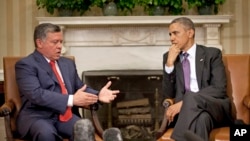WHITE HOUSE —
President Barack Obama says the world cannot stand by and permit any use of chemical weapons, and says the United States will work with international partners to vigorously investigate evidence in hand so far.
In remarks before his meeting with Jordan's King Abdullah, Obama said the U.S. now has "some evidence" with "varying degrees of confidence" that chemical weapons have been used in Syria.
He said a range of questions remain about how and when such weapons may have been used. The U.S. will pursue a vigorous investigation in consultation with partners and the United Nations, moving as effectively and quickly as possible.
Obama said the U.S. and partners must act prudently and make assessments deliberately, but said the world cannot stand by and permit the use of chemical weapons.
"All of us, not just in the United States but around the world, recognize how we cannot stand by and permit the systematic use of weapons like chemical weapons on civilian populations," he said.
Obama mentioned the danger of chemical weapons falling into the hands terrorists, which he said adds increased urgency to the Syrian situation.
As to whether his "red line" has been crossed, he said his message has been clear.
"For the Syrian government to utilize chemical weapons on its people, crosses a line that will change my calculus, and how the United States approaches these issues," he said.
At the same time, Obama said preliminary evidence is "not an on or off switch" for potential action, but an ongoing challenge for the U.S. and international community which must gather further evidence.
Earlier, White House spokesman Jay Carney said Obama is keeping all options on the table, including military force, while the investigation into chemical weapons use proceeds to firmly establish that a 'red line' has been crossed.
The two leaders also discussed pressures on Jordan of supporting a huge influx of refugees from Syria, and King Abdullah underscored concerns about fragmentation of Syria and the rise of extremist groups.
"We are now seeing the surge of the second threat of militant terrorist organizations that have risen over the past several months," said King Abdullah.
In his remarks, President Obama said again that President Bashar al-Assad has "lost legitimacy" adding that a multi-sectarian political solution to the conflict is required, but hard to accomplish.
Bringing an end to the Syrian conflict, he said, is a long-term proposition that will not be solved easily overnight.
In remarks before his meeting with Jordan's King Abdullah, Obama said the U.S. now has "some evidence" with "varying degrees of confidence" that chemical weapons have been used in Syria.
He said a range of questions remain about how and when such weapons may have been used. The U.S. will pursue a vigorous investigation in consultation with partners and the United Nations, moving as effectively and quickly as possible.
Obama said the U.S. and partners must act prudently and make assessments deliberately, but said the world cannot stand by and permit the use of chemical weapons.
"All of us, not just in the United States but around the world, recognize how we cannot stand by and permit the systematic use of weapons like chemical weapons on civilian populations," he said.
Obama mentioned the danger of chemical weapons falling into the hands terrorists, which he said adds increased urgency to the Syrian situation.
As to whether his "red line" has been crossed, he said his message has been clear.
"For the Syrian government to utilize chemical weapons on its people, crosses a line that will change my calculus, and how the United States approaches these issues," he said.
At the same time, Obama said preliminary evidence is "not an on or off switch" for potential action, but an ongoing challenge for the U.S. and international community which must gather further evidence.
Earlier, White House spokesman Jay Carney said Obama is keeping all options on the table, including military force, while the investigation into chemical weapons use proceeds to firmly establish that a 'red line' has been crossed.
The two leaders also discussed pressures on Jordan of supporting a huge influx of refugees from Syria, and King Abdullah underscored concerns about fragmentation of Syria and the rise of extremist groups.
"We are now seeing the surge of the second threat of militant terrorist organizations that have risen over the past several months," said King Abdullah.
In his remarks, President Obama said again that President Bashar al-Assad has "lost legitimacy" adding that a multi-sectarian political solution to the conflict is required, but hard to accomplish.
Bringing an end to the Syrian conflict, he said, is a long-term proposition that will not be solved easily overnight.






